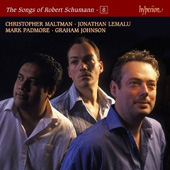|
You are reading the older HTML site Positive Feedback ISSUE 9 october/november 2003
Early Fall Goody Bag of Classical Recordings, Part 1
I apologize in advance for the brevity of the individual review notes that follow, but there have been so many good recordings passing through my house the last few months that if I wait to have profound and extended thoughts on them all, I’ll never get this into print. This is the first of (at least) two review articles I plan to get out before the snow falls.
Walter Piston, Sonata for Orchestra, Symphonies 5 6, and 7. Louisville Symphony Orchestra, Robert Whitney, Jorge Mester. First Edition (distributed by Harmonia Mundi). Aaron Copland stands astride (and deep within) modern American classical music; and it is fascinating to watch how his contemporaries and successors deal with his powerful and insidious influence. Sometimes the only way to resist Copland is to oppose him (in musical style), which is what I hear primarily in the equally admired if not equally loved oeuvre of Elliot Carter. Walter Piston, Walter Sessions, David Diamond, and Howard Hanson, to name just a few of the better known Copland contemporaries, have all wrestled with rather than opposed him and managed to write appealing if not always distinctive music. In this fascinating recording of Piston’s orchestral music, we can actually hear the composer struggle with the Copland influence in Symphony 5, written in 1957, wandering into a Copland-like phrase or riff, then skitter away into some sort of evasive musical rhetoric.And then we hear him emerge from the influence and find his own, actually very compelling, voice in Symphonies 6 and 7 written in 1960 and 1965. Moving from Symphony 5 to Symphony 6, we immediately find ourselves in more introspective territory, with very few hints of Copland anywhere to be found.Piston is among the most appealing of modernist/romantic Americans and his secret, to my ears, lies in the importance he almost always gives to wind instruments, both woodwinds and brass. (Most casual listeners have at least heard his The Incredible Flutist.) He clearly wants the uniquely cutting clarity that winds provide and gets it. In the Symphony 7, when he wants maximum bass thrust and impact, while he begins with cellos and double basses, the bassoons, contrabassoons, and trombones are not far behind! The First Edition Series is the name given by the Louisville Orchestra to a group of premier recordings of modern and mainly, though not exclusively, American music made between 1952 and 1967, a huge ‘edition’ that eventually numbered 125 LP’s. By 1995, the First Edition series numbered 158 LP and 10 CD releases of over 400 works by 250 different composers. Converting the rest of this rich archive into CD’s has now become the project of the Santa Fe Music Group, who have dedicated themselves to disseminating the entire First Edition catalog into "ever-evolving technical means," under the new First Edition Music label. A worthy task which I look forward to staying in touch with.
Vivaldi, Sacred Music, Volume 9, Robert King and TheKing’s Consort; Schumann, Songs, Volume #8, singers, Graham Johnson, piano. Both on Hyperion. I have put these two recordings together to make it easier to praise Hyperion for its ongoing commitment to recording complete sets of major but mainly under-recorded music. Thanks to Hyperion, we have the complete sacred music of Purcell as well as his complete music for theatre; and the complete lieder of Schubert, which many, including me, consider that composer’s major contribution to the history of music. There are other sets (a wonderful if incomplete set of Haydn symphonies by Roy Goodman among them); but these (and the Haydn) are the ones for which I am especially grateful. And now we have a progressing set of Schumann songs, and a complete set of the most under-appreciated and worthy sacred vocal music—Vivaldi’s, which, to my ears, along with his operas and oratorios, can stand toe-to-toe with Handel, giving no quarter. The first time I heard a piece of Vivaldi’s sacred music—and it was not the justly famous Gloria—I was knocked off my seat. Vivaldi is not afraid to glorify. He is not afraid to just let his violins and soloists let loose and fly. This is truly great and enormously infectious music and while I urge you to run out and grab this final volume of the series, Volume 9, since that’s the CD I’m essentially hawking here, it makes at least as good sense to track down any of the previous eight. Robert King’s Vivaldi is not as bracing and bold as some of the currently more fashionable interpretations (most of which I like a lot); but it is also not Hogwood’s more gentile approach (which I also enjoy) either. It balances traditional beauty with gusto and achieves a satisfying middle ground that wears extremely well. Middle grounds are not always boring and are sometimes right. I love this series and it will be definitive in our house for a long time. I grant you, lieder is an acquired taste, especially for the modern listener who is less likely to have heard it live before meeting it in recordings. Even so enthusiastic a music lover as I came to it last, happening upon a Schumann song on FM on a rainy afternoon on the Eastern Shore of Maryland at the ripe old age of 42. I acquired the taste at that moment. Schumann’s lieder tends to be a bit bolder and more dramatic than Schubert’s, but both have a rich spareness (!), with either tenor or baritone, that can cut right to the bones of the kind of emotional experience that music calls up as no other medium quite can. Graham Johnson has been the piano accompanist for both the Schubert and Schumann series and, obviously in conjunction with the recording engineer (Julian Millard on this recording), has found a way to get his instrument just far enough back from the foreground to make its role subtlely subordinate to the soloist. This is the kind of thing I appreciate a great deal and in this recording it contributes to the appeal of the performance. Both the Schubert and Schumann series have made use of a variety of today’s leading soloists to keep the musical point of view that of the composer rather than of any one interpreter. Mark Padmore is the tenor this recording, Christopher Maltman and JonathanLemalu, the baritones. There are 31 songs, the nine Liederkreis, Opus 24 being the centerpiece. Fans of Schumann need no additional encouragement to pursue this CD beyond its existence and that of the series. I have not heard more than a handful of Schumann lieder recordings—Bostridge, Goerne, Schreier—and this one certainly holds its own. It is extremely moving and, the ideal in a complete series, utterly without affectation. But why should newcomers to lieder look into it? To visit what used to be one of the principal provinces of classical music, one that has essentially vanished from our world. To discover whether or not its extraordinary ability to float lyrical eloquence in the midst of quietness, is still reachable by modern ears.
|



